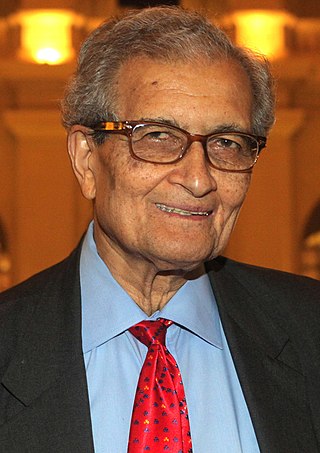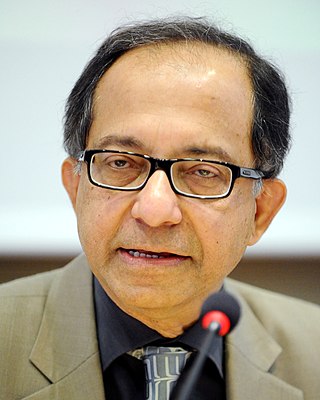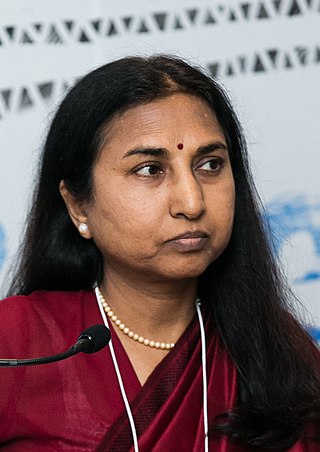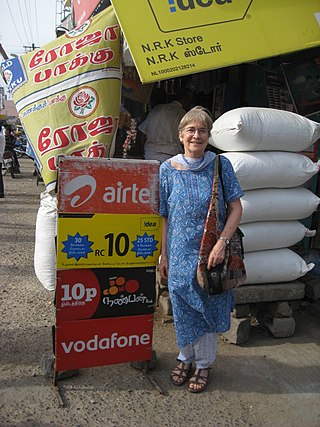
Amartya Kumar Sen is an Indian economist and philosopher, who since 1972 has taught and worked in the United Kingdom and the United States. Sen has made contributions to welfare economics, social choice theory, economic and social justice, economic theories of famines, decision theory, development economics, public health, and measures of well-being of countries.

Company rule in India was the rule of the British East India Company on the Indian subcontinent. This is variously taken to have commenced in 1757, after the Battle of Plassey, when the Nawab of Bengal Siraj ud-Daulah was defeated and replaced with Mir Jafar, who had the support of the East India Company; or in 1765, when the Company was granted the diwani, or the right to collect revenue, in Bengal and Bihar; or in 1773, when the Company abolished local rule (Nizamat) in Bengal and established a capital in Calcutta, appointed its first Governor-General, Warren Hastings, and became directly involved in governance. The Company ruled until 1858, when, after the Indian Rebellion of 1857 and the Government of India Act 1858, the India Office of the British government assumed the task of directly administering India in the new British Raj.

Jagdish Natwarlal Bhagwati is an Indian-born naturalized American economist and one of the most influential trade theorists of his generation. He is a University Professor of economics and law at Columbia University and a Senior Fellow in International Economics at the Council on Foreign Relations. He has made significant contributions to international trade theory and economic development.

India was one of the largest economies in the world, for about two and a half millennia starting around the end of 1st millennium BC and ending around the beginning of British rule in India.

Kaushik Basu is an economist who was Chief Economist of the World Bank from 2012 to 2016 and Chief Economic Adviser to the Government of India from 2009 to 2012. He is the C. Marks Professor of International Studies and Professor of Economics at Cornell University, and academic advisory board member of upcoming Plaksha University. He began a three-year term as President of the International Economic Association in June 2017. From 2009 to 2012, during the United Progressive Alliance's second term, Basu served as the Chief Economic Adviser to the Government of India. Kaushik Basu is winner of the Humboldt Research Award 2021.

Tapan Raychaudhuri was a British-Indian historian specialising in British Indian history, Indian economic history and the History of Bengal.

Bina Agarwal is an Indian development economist and Professor of Development Economics and Environment at the Global Development Institute at The University of Manchester. She has written extensively on land, livelihoods and property rights; environment and development; the political economy of gender; poverty and inequality; legal change; and agriculture and technological transformation.
Kirti Narayan Chaudhuri is a historian, author, writer, graphic artist, and lately, a film-maker. He is the second son of the Indian writer Nirad C. Chaudhuri. Chaudhuri has spent most of his adult life travelling and working in the Middle East, North Africa, South America, and Europe. He is a member of the British Academy and the Academia Europaea. Chaudhuri was ranked Number 58 on The Daily Telegraph's list of the "Top 100 Living Geniuses".
The role and scale of British imperial policy during the British Raj on India's relative decline in global GDP remains a topic of debate among economists, historians, and politicians. Some commentators argue the effect of British rule was negative, and that Britain engaged in a policy of deindustrialisation in India for the benefit of British exporters which left Indians relatively poorer than before British rule. Others argue that Britain's impact on India was either broadly neutral or positive, and that India's declining share of global GDP was due to other factors, such as new mass production technologies or internal ethnic conflict.

The timeline of major famines in India during British rule covers major famines on the Indian subcontinent from 1765 to 1947. The famines included here occurred both in the princely states, British India and Indian territories independent of British rule such as the Maratha Empire.
Rajat Kanta Ray is a historian of South Asian history, specializing in Modern Indian history.

Sanjay Subrahmanyam is an Indian historian who specialises in the early modern period and in connected history. He is the author of several books and publications. He holds the Irving and Jean Stone Endowed Chair in Social Sciences at UCLA which he joined in 2004.
The Economy of India under Company rule describes the economy of those regions that fell under Company rule in India during the years 1757 to 1858. The British East India Company began ruling parts of the Indian subcontinent beginning with the Battle of Plassey, which led to the conquest of Bengal Subah and the founding of the Bengal Presidency, before the Company expanded across most of the subcontinent up until the Indian Rebellion of 1857.

Pranab Bardhan is an Indian economist who has taught and worked in the United States since 1979. He is Professor Emeritus of Economics at the University of California, Berkeley.

The Mughal Empire was an early modern empire based in South Asia between the 16th and 19th centuries. For some two hundred years, the empire stretched from the outer fringes of the Indus River Basin in the west, northern Afghanistan in the northwest, and Kashmir in the north, to the highlands of present-day Assam and Bangladesh in the east, and the uplands of the Deccan Plateau in South India.

Sugata Marjit is the former Vice Chancellor of the University of Calcutta and currently the First Distinguished Professor at Indian Institute of Foreign Trade and the Project Director of Centre for Training & Research in Public Finance and Policy (CTRPFP) [A Ministry of Finance, Government of India funded initiative]. He is a Ph.D. at the University of Rochester and currently the Editor of South Asian Journal of Macroeconomics and Public Finance. He used to be the Director of Centre for Studies in Social Sciences, Calcutta from March 2007 to March 2012 and Reserve Bank of India Chair Professor of Industrial Economics at CSSSC till September, 2019. On 15 July 2015 he took the charge as an interim Vice-Chancellor of the prestigious University of Calcutta, Kolkata, India.

Martha Chen is an American academic, scholar and social worker, who is presently a lecturer in public policy at the Harvard Kennedy School and senior advisor of the global research-policy-action network WIEGO and a member of the Advisory Board of the United Nations University World Institute for Development Economics Research (UNU-WIDER). Martha is a development practitioner and scholar who has worked with the working poor in India, South Asia, and around the world. Her areas of specialization are employment, poverty alleviation, informal economy, and gender. She lived in Bangladesh working with BRAC, one of the world's largest non-governmental organizations, and in India, as field representative of Oxfam America for India and Bangladesh for 15 years.

Muslin, a cotton fabric of plain weave, was historically hand woven in the areas of Dhaka and Sonargaon in Bangladesh and exported for many centuries. The region forms the eastern part of the historic region of Bengal.

Barbara Harriss-White is an English economist and emeritus professor of development studies. She was trained in geography, agricultural science, agricultural economics and self-taught in development economics. In the 1990s, she helped to create the multi- and inter- disciplinary thematic discipline of development studies in Oxford Department of International Development; and in 2005-7 founded Oxford's Contemporary South Asia Programme. She has developed an approach to the understanding of Indian rural development and its informal economy, grounded in political economy and decades of what the economic anthropologist Polly Hill called ‘field economics’.
The economy of the Mughal Empire was large and prosperous. India producing about 28% of the world's industrial output up until the 18th century. Mughal India's economy has been described as a form of proto-industrialization, like that of 18th-century Western Europe prior to the Industrial Revolution.














